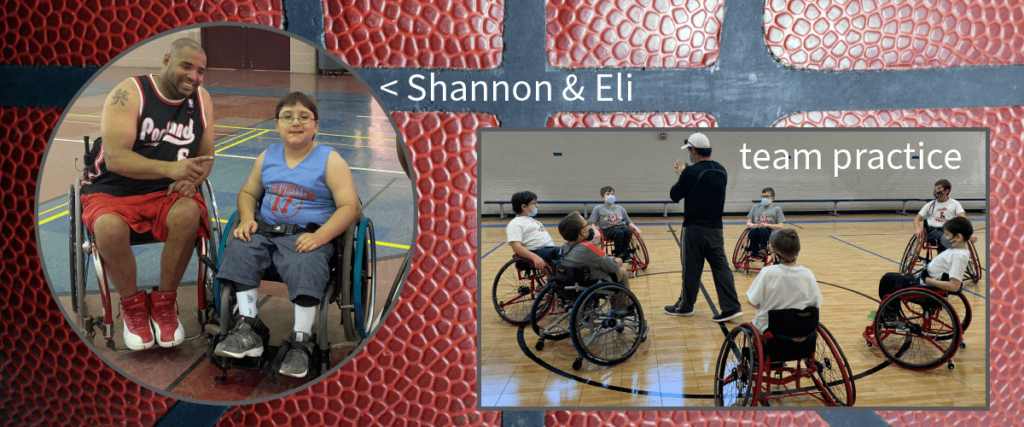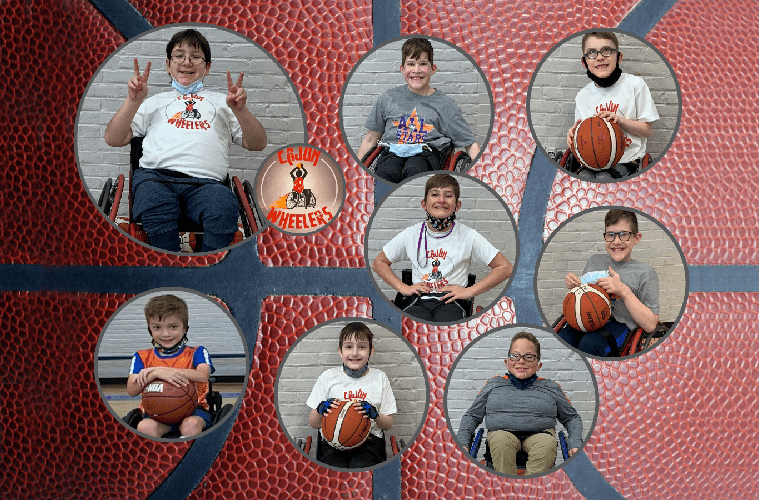 CURE NATION: If you want to know how something can be done, talk to Eli. He and his grandmother, Ann Guillotte, (aka Grammy), saw the need for a wheelchair basketball team in their home state of Louisiana. We are all familiar with people who see an unfilled need and are content to simply complain about it. That is not Eli and Grammy. This duo actually made it happen.
CURE NATION: If you want to know how something can be done, talk to Eli. He and his grandmother, Ann Guillotte, (aka Grammy), saw the need for a wheelchair basketball team in their home state of Louisiana. We are all familiar with people who see an unfilled need and are content to simply complain about it. That is not Eli and Grammy. This duo actually made it happen.
I had the pleasure of speaking with 12-year-old Eli after school and before homework recently. He filled me in on how to create something that could be cool but isn’t yet available. Read on and learn from Eli:
“Me and Grammy were sitting there one day watching TV and I saw grown-ups playing basketball, and I thought hey, I’d really like to do this!” says Eli with supreme confidence. “So, I went to the NWBA site and looked there. I was always wondering if there was a sport for kids like me who want to play basketball.”
Ann agrees. “I try to encourage him in everything he wants to do” she explains. “I figure at least he can try!”
When he got interested in basketball, we began looking here in Louisiana for a wheelchair basketball league, but we didn’t find anything. So, we went to our local Parks and Rec and just asked – where do we start?”
Eli grins at Grammy and picks up the story, “Well, it was my idea first, ok, but we put our minds together, we just said ok we’ll start fresh, and we looked at other websites and we just figured it out. It’s the way we do things.”
Parks and Rec suggested they check out the Southwest Wheelchair Basketball Championship, which gave Eli and Ann their first glimpse into the process of first starting a team, then becoming a non-profit.
Ann remembers, “The guys were just great! Eli went on the court with the adults and they just took him in. The mentorship is just wonderful with everyone I’ve met so far.”

Eli’s face lights up as he suddenly straightens, saying intently, “Another guy – a really, really important guy – is Shannon Revere. He got in a motorcycle accident but came to play wheelchair basketball in 2004. He’s just been a really cool guy!”
How do you meet someone that cool?
“Well, we had gone to this park, talked to Miss Denise and told her about our idea. She knew Shannon and she said, ‘Hey, I want you to meet someone.’” Eli beams. “Shannon Revere said ‘Hey, man!’” Ann chimes in, “Shannon Revere began talking to Eli, really bringing mentorship to him, and made a big impact.
“Since we didn’t know where to begin.” Ann explains, continuing the story, “We went to Mississippi where they had a kids’ team, the Mississippi Wheel Cats. Eli met them and he was instantly accepted and loved! We couldn’t stop there, though, we just knew that it was wrong not to have something for all the kids in Louisiana.”
According to Eli, the support he found in the kids’ league was something that he wanted to share with his friends, especially the kids he met at the spina bifida camp.
“I want more kids to be on my team, just to have fun. I want to let their parents know that this is a great thing to do.”
So how has Eli benefitted? I ask Ann. Ann’s voice glows.
“He has grown muscles and has gotten stronger, that’s for sure. He’s always on YouTube watching the games, College games, anything the little ones can watch and see what’s possible. They show the basketball players living in dorms…” Ann’s voice trails off, looking into a possible future, then snaps back, strong, “It all shows them that as long as they want to attempt something they can. It gives them encouragement to do what they want.” When asked about his favorite part of the whole sports experience, Eli considers his answer carefully before speaking.
“Well, I guess, I don’t know, really. There’s a lot! I like making friends and it’s really fun just being competitive. I don’t have a position yet, my favorite part I like about it, I like shooting best.”
Eli’s gaze lingers thoughtfully on his grandma, then he continues, “Before this team I played with the team in Mississippi. My first time shooting, I missed, but then I just kept practicing and I got better!”
Without missing a beat, Ann picks up the narrative, “The friendships that he developed, the ability to roll across the court and learn to play! I had no idea, I just knew that we had to figure out a way for our kids at home to have this.”
Eli and his Grammy make a cohesive team. When Eli was born with spina bifida, Ann was a pediatric nurse. Looking at a future beyond feedings and diaper changes, Grammy saw other needs approaching for Eli.
“When Eli was 4, I suggested he begin piano lessons.” Ann begins. “I could see that in his life he would need a deeper way to connect with his emotions, and I knew that music could do that. I just wanted him to express himself, but it’s therapy as well. Besides exercising his fingers, piano helps with that hand/eye coordination. Having your brain connect with hands going in different directions isn’t easy for kids with spina bifida.“
What Ann Thinks About Cure Medical
Like many people born with spina bifida, Eli uses catheters. It is on his wish list to be able to catheterize himself, which Ann also hopes to see. They use the Cure Catheter, but have recently learned of the Cure Dextra, a closed system designed for people seeking greater independence due to limited dexterity.
Like many Cure Medical catheter users, Ann loves the fact that Cure Medical donates 10% of their net income to medical research in pursuit of finding a cure for paralysis.
“That is really a wonderful thing for them to do. Just awesome!” Ann says excitedly. “Companies don’t have to donate anything like that, so it says a lot that Cure Medical is that dedicated to the community.”
Dedicated to the community. Just like Ann and Eli.
For more information about wheelchair sports, go to: www.nwba.org.
Another option for kids with disabilities to play sports in Louisiana: www.dreamsfoundationaca.org.
To find out more about the Cajun Wheelers: https://www.cajunwheelers.com/
To reach Ann and Eli:
Ann Guillotte
The Cajun Wheelers
(337)-654-2309
cajunwheelers@gmail.com


